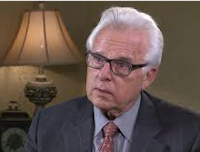By Dr. Sydney Grant
The headline reads “Bill C-7 removes “reasonably foreseeable death” as a requirement for MAID” - where one’s death had to be foreseeable 4 years before, MAID (Medical Aid in Dying) or euthanasia resulted from a law passed in 2016 called Bill C-14, there was a new law.
Bill C-7 resulted from Justice Baudouin of Quebec’s Superior Court striking down the federal prohibition on physician-assisted dying arguing that the old law violated the Canadian Charter of Rights and Freedom by only allowing MAiD for people whose deaths are reasonably foreseeable and therefore was unconstitutional. Hard to believe but Quebec was protesting that since it was only those who were about to die that “benefited” from this law and that was unconstitutional. Parliament could have appealed this terrible decision or narrowly amend the law to abide by Quebec’s decision. They didn’t.
Since Bill 14, more than 14,000 people have been killed by MAID. Bill C-7 proposes to remove that requirement that a person’s death is foreseeably foreseeable. People with disabilities and those who live with psychological pain are now prime candidates for euthanasia, if they so desire. Exhaustive efforts at life-saving, restorative or pain alleviating therapies would no longer be necessary. It could create situations where disabled people could be offered a MAID death instead of being offered those other supports to live a healthy and fulfilling life.
One former city counselor from Invermere, BC, Spring Hawes, who has a spinal cord injury and uses a wheelchair, has said
“Rather than funding and making life a possible and viable choice for many people, we’re entertaining the option of asking them if they would like to die, and it’s very scary.”
Hawes points out that two thirds of disabled people live in poverty, or can’t afford their medications. They suffer violence at higher rates than the able-bodied population and many don’t have accessible housing or transportation. Studies show when offered these supports, people with disabilities report having a very high standard and satisfaction with their quality of life. In her own case, a few months after she suffered her spinal cord injury Hawes said that she couldn’t move her arms and had a feeding tube. She says that if someone had come and offered her MAID at that point that she would have taken it. More than 300 disability groups in Canada oppose the change in the law.
Although “mental illness” will not be considered a diagnosis for consideration of MAID, “psychological suffering” is. Now as a physician, even I cannot deduce what that means.
“Depression” can be a very obtuse diagnosis – from “bad hair days” to “manic depression” - the former mild and brief states of sadness to intense states that are so severe as to cause bouts of consideration of committing suicide – to actually suiciding. At times it can be called “psychological suffering”, a permissible diagnosis for euthanasia but it may not be permissible if it is “manic depression” or as it is called now “bipolar disorder” – a “mental disorder.” The diagnosis depends on the presence of associated mania which often involves hallucinations, psychosis, grandiose delusions or paranoid rage. It would take a difficult decision process to differentiate the ordinary depression from that other aspect – the bipolar aspect or “manic depression.”
There was a waiting period under the 2016 law. Patients with a foreseeable death could have 10 days in which to change their mind. Bill C-7 would amend the Criminal Code to permit MAID for individuals whose natural death is not reasonably foreseeable to have 90 days to reassess. For those whose death is foreseeable, the 10 day assessment period is waived. If one was convinced enough on the first day of the request of their need for death, as the Bill now stands, death could be administered on that day.
Only one independent witness, rather than two will be necessary for the signing of permission for the procedure for those with foreseeable death. For individuals whose natural death is not foreseeable there would be a 90 day assessment period, a second eligibility assessment by a practitioner, with expertise in the condition that is causing the person’s suffering, is necessary and two clarifications of informed consent.
Although not requested by the Bill, in the case of consideration by disabled individuals considering euthanasia, testimony of those countless people with acquired physical disabilities in the past who have come to a position of acceptance must be considered. The offering of already initiated or continued physiotherapy, although seemingly slow, must be continued. The example of similar others who are living a productive life in a state of reasonable contentment must serve as an inducement to continue even maintenance therapy.
In the case of terminal illness where death is foreseen rather than cure, the offer of palliative care must be considered. It is offered in almost all hospitals either in a separate unit or as part of the “medical” service.
This writer was involved in the first such palliative care unit at the Dr. Everett Chalmers Hospital in the late 1980's and until 2012. The evidence for the efficacy of medications given appropriately for pain, nausea and shortness of breath control in terminal illnesses is an accepted fact now. Patients are managed for such symptoms until a state of comfort is reached until the patient dies or can be discharged to home. Or if that is not possible, the patient can continue to be cared for on the Palliative Care Service until death occurs. Family involvement is a major part of this care – at least until such an event like the present pandemic occurs, and then home care becomes even more necessary and strived for.
We have a great home-care service in New Brunswick, the Extra-Mural Hospital (EMP) also known as “the hospital without walls,” All of the necessary services, eg. Nurses, including practical nurses, Social Workers, Respiratory Therapists, Dietitians, etc. are all available under EMP. Such care allows the family relief from the worry involving the practical matters of a sick loved one at home. The relationships within the family that were so present throughout the life of the patient are allowed to go on – even during a crisis like the Covid – 19 pandemic. The concern about symptom control is lessened as a result of stabilization of these symptoms during a hospital stay or, if needed still, in the home.
The ability to remember great memories of the past; to relate more significantly than before; to take part again in family conversations; perhaps to laugh again over funny past or current occurrences and to express love for one another – all are part of the continuation of a life that will be abbreviated in a near future. Cutting all of this short by an earlier “planned” death may happen with attendant lack of assurance of the rightness of the decision and possible guilt on the part of family members who may have been involved in the decision. This will result often in a sense in those closest that maybe this period of “final things” has been missed – that so much that should have been said was not said and therefore there really is not “finality” – only “unfinished business”.
The drawing back together in difficult broken relationships is very necessary when a death is near in a family or a friendship. If not allowed to go on the grief is only enhanced perhaps by prolonged guilt long after the death. These are the reasons that nobody can deny the necessary process of living and allowing others to live until the end. Others might criticize us who oppose euthanasia on the basis of ethics or faith – it is difficult to criticize on the basis of love and caring.
Dr. Sydney Grant is a pioneer in palliative care in New Brunswick Canada.





















